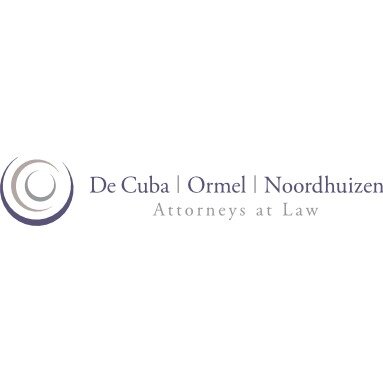Best Creditor Lawyers in Oranjestad
Share your needs with us, get contacted by law firms.
Free. Takes 2 min.
List of the best lawyers in Oranjestad, Aruba
About Creditor Law in Oranjestad, Aruba
Creditor law in Oranjestad, Aruba encompasses the legal rights and obligations related to the collection of debts and the enforcement of creditor's rights. This field of law deals with issues such as the recovery of outstanding debts, negotiation with debtors, and legal actions against non-payment. Given Aruba's legal system, which is based on the Dutch civil law system, creditor law in Oranjestad shares similarities with broader international practices but also incorporates unique local regulations designed to protect both creditors and debtors.
Why You May Need a Lawyer
Individuals or businesses may require legal assistance in creditor matters for several reasons, including:
- Collecting outstanding debts from individuals or companies that have defaulted.
- Understanding the rights and obligations of creditors under Aruban law.
- Navigating complex financial transactions or disputes over loan agreements.
- Drafting and interpreting contracts and repayment agreements to ensure enforceability.
- Representation in court proceedings related to debt collection or bankruptcy.
- Negotiating settlements or renegotiating terms with debtors.
- Implementing effective strategies for debt recovery and risk mitigation.
Local Laws Overview
Creditor law in Oranjestad, Aruba is guided by several key legislations, which include:
- Civil Code of Aruba: This code outlines the general principles of obligations, contracts, and property law, all of which are important for creditor-debtor relationships.
- Bankruptcy Ordinance: Governs the proceedings related to the insolvency of businesses or individuals, including the hierarchy of creditors.
- Contract Law: Establishes the legal framework for contract formation, execution, and enforcement, including loan agreements.
- The Debt Collection Decree: Specific regulations concerning the methods and limits of debt collection practices in Aruba.
Frequently Asked Questions
What rights do creditors have in Oranjestad, Aruba?
Creditors have the right to demand repayment of debts, enforce contracts, and, if necessary, initiate legal proceedings to recover outstanding debts.
What options are available if a debtor cannot pay?
Creditors may negotiate new repayment terms, accept a settlement, or, in some cases, request the court to declare the debtor bankrupt.
How long does a creditor have to collect a debt?
The statute of limitations for debt collection in Aruba generally ranges from five to twenty years depending on the nature of the contract and debt.
Can interest be charged on outstanding debts?
Yes, interest can generally be charged on outstanding debts provided it is stipulated in the contract and complies with legal limits.
What is the process for declaring bankruptcy in Aruba?
Bankruptcy proceedings are initiated through the court which involves evaluating the debtor's assets, liabilities, and determining the distribution of assets to creditors.
Are there regulations against aggressive debt collection practices?
Yes, there are regulations intended to prevent harassment or abusive practices during debt collection, protecting both debtors' rights and maintaining fair practices.
Can a creditor seize assets from a debtor?
Assets may only be seized following a court judgment, and seizure must be executed by a legal authority in compliance with due process.
Is mediation available in creditor disputes?
Mediation can be a viable option to amicably resolve disputes without resorting to court proceedings, potentially saving time and resources.
Can personal property be protected from creditors?
Some personal properties may be exempt from seizure under specific circumstances, based on the debtor’s situation and legal provisions.
What should be included in a repayment agreement?
A repayment agreement should clearly state the amount owed, repayment schedule, interest rate (if any), and consequences for non-compliance.
Additional Resources
For those needing further guidance, the following resources may be helpful:
- Chamber of Commerce Aruba: Offers resources and information on commercial legislative matters.
- The Bar Association of Aruba: Provides access to accredited legal professionals specializing in creditor law.
- Ministry of Justice of Aruba: Information on legal processes and regulatory frameworks.
- Legal Aid Aruba: Can provide assistance to individuals who require legal help but cannot afford private services.
Next Steps
If you need legal assistance related to creditor issues in Oranjestad, Aruba, consider taking the following steps:
- Document all relevant information regarding your situation, including contracts, correspondence, and any attempts at collection or settlement.
- Consult with a qualified legal professional experienced in creditor law to evaluate your case and provide personalized advice.
- Engage in initial consultations to understand your legal options and the potential outcomes of pursuing legal action.
- In case of litigation, work closely with your lawyer to prepare and present your case in an Aruban court, if necessary.
Engaging with a knowledgeable attorney is crucial to navigate the complexities of creditor law and to protect your interests effectively.
Lawzana helps you find the best lawyers and law firms in Oranjestad through a curated and pre-screened list of qualified legal professionals. Our platform offers rankings and detailed profiles of attorneys and law firms, allowing you to compare based on practice areas, including Creditor, experience, and client feedback.
Each profile includes a description of the firm's areas of practice, client reviews, team members and partners, year of establishment, spoken languages, office locations, contact information, social media presence, and any published articles or resources. Most firms on our platform speak English and are experienced in both local and international legal matters.
Get a quote from top-rated law firms in Oranjestad, Aruba — quickly, securely, and without unnecessary hassle.
Disclaimer:
The information provided on this page is for general informational purposes only and does not constitute legal advice. While we strive to ensure the accuracy and relevance of the content, legal information may change over time, and interpretations of the law can vary. You should always consult with a qualified legal professional for advice specific to your situation.
We disclaim all liability for actions taken or not taken based on the content of this page. If you believe any information is incorrect or outdated, please contact us, and we will review and update it where appropriate.










